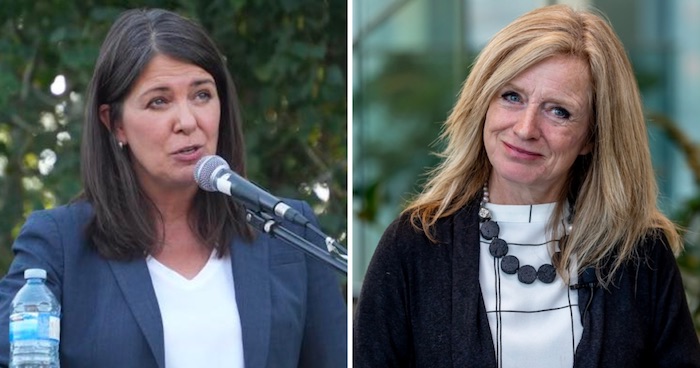Alberta
The Most Expensive Campaign Promise Ever – Explainer

This article was submitted by Peter McCaffrey, President 0f the Alberta Institute
Over the coming weeks, I’ll be analyzing some of the big policy announcements that the major parties in the Alberta election make.
So, today, we’re going to kick things off with a look at an issue that made headlines yesterday – electricity policy.
I know, I can almost see your eyes glaze over through your webcam, but bear with me – this is important!
Last March, Justin Trudeau announced the release of the federal government’s “2030 Emissions Reduction Plan: Canada’s Next Steps for Clean Air and a Strong Economy”.
Who could be opposed to Clean Air and a Strong Economy, right?
The devil, as always, was in the details and, in this case, the details are called the “Clean Electricity Regulations”.
The federal government has been talking for some time about “transitioning” Canada’s entire electricity sector to being “net-zero” (ie: no net carbon emissions) by 2050.
The “Clean Electricity Regulations”, though, are the federal government’s plan to speed up this transition and require the provinces to have net-zero electricity grids by 2035 instead.
Now, for some provinces, that won’t actually be too challenging, as they already generate the vast majority of their electricity from Hydro.
But for Alberta (and Saskatchewan), it will be practically impossible – and insanely expensive.
That hasn’t stopped Rachel Notley and the NDP from promising to follow the federal government’s lead and do it, though.
So, let’s take a deep dive into exactly why this policy could be so harmful to Alberta.
First, in Alberta, about 85% of electricity on the commercial market comes from non-renewable resources.
That means that, in order to achieve net-zero here, we’d have to rebuild almost literally the entirety of our electricity market in the next 12 years.
If that sounds expensive to you – you’d be right!
In July 2020, when the federal government first started floating this idea, the Alberta Electric System Operator (AESO) wrote a report that calculated that transitioning Alberta to a net-zero electricity grid by 2035 would cost $52 billion in additional capital investments and generation operating costs.
Yes, you read that right – $52 billion.
And, to be clear, that $52 billion isn’t the entire price of transitioning to net-zero – that would be much more – the $52 billion is just the extra price of doing it faster, by 2035 instead of 2050!
Next, fast forward to yesterday, and a new report was been released that assesses those direct capital and infrastructure costs calculated by AESO, and works out what the additional indirect economic harm to Alberta would be of being forced to make this rapid transition.
This new report was written by a group called Navius, who are traditionally seen as a left-leaning environmental economic research group, and even they say that the indirect impacts to Alberta’s economy will be enormous – $35 billion – and that’s before they even account for inflation.
So, now, thanks to these two reports, we know exactly what the federal government’s 2035 net-zero electricity grid plan will cost Alberta.
$52 billion in direct costs to upgrade and build infrastructure, plus at least $35 billion in indirect economic costs, for a total of at least $87 billion.
And, as I mentioned before, Rachel Notley and the NDP are fully on board.
They aren’t advertising their support, of course.
Just like with the carbon tax in 2015, they aren’t campaigning on this policy, and they haven’t mentioned it on their website or included it in their campaign material.
But, at a private NDP event last year and in a few occasional tweets, Rachel Notley has confirmed that the NDP is committed to this idea.
And, just like in 2015 with the carbon tax, they’re hoping Albertans won’t notice until after the election.
Let’s be clear, though – a policy of implementing a net-zero electricity grid by 2035 makes the carbon tax look like a bargain by comparison.
The carbon tax costs Albertans about $2 billion.
Don’t get me wrong, that’s a huge amount of money.
But $87 billion (or more) over just 12 years is more than $7 billion a year.
I really worry that people don’t understand just how much money we’re talking about here.
It’s an absolutely insane amount.
Let’s try to put it into scale…
$87 billion is more than the entire Alberta government budget ($63 billion).
$87 billion is 48 times the cost of the Red Deer Hospital.
$87 billion is 290 times as much as the province’s “controversial” Calgary arena investment.
$87 billion would pay for the salaries of every single nurse in Alberta for 70 years.
One more… just for fun…
$87 billion would buy a Tesla Model 3 for literally every household in the province.
Yes, seriously – you get a Tesla, you get a Tesla, everyone gets a Tesla!
This is honestly such an insane amount of money that I’m genuinely not even sure that the NDP realizes exactly what they’ve committed to here.
“Never has a politician committed to a policy that would cost this much to implement. This is not only unrealistic, but it is dangerous to the long-term health and viability of our economy,” said UCP Candidate Brian Jean.
It is the single biggest election promise in Alberta history, and it’s not even close.
Thankfully, here at the Alberta Institute, our team is working hard to assess and analyze campaign promises to make sure that you have the facts at your fingertips, and that you’re fully aware of just how much our politician’s promises are going to cost you.
I’d love to be able to bring you more of this type of analysis, so if you support our work, please help us continue to provide you with the level of in-depth policy research by making a donation to support our work:
The Alberta Institute is an independent, libertarian, public policy think tank that aims to advance personal freedom and choice in Alberta.
Founded in 2018, we work to develop and promote solutions to a wide range of municipal, provincial, and federal public policy issues in a strictly non-partisan way.
Our solutions are informed by our belief in a free and open society built on individual rights, private property, peace, voluntaryism, free markets, free minds, free trade, free movement, self-ownership, and reason.
We promote these beliefs through a wide variety of activities and actions, including research, data analysis, publications, newsletters, advocacy, events, conferences, and more.
Independence:
The Alberta Institute’s work is funded by thousands of small-dollar donors from across Alberta who believe in – and wish to support – our mission.
We don’t accept any government funding – and we never will – because we think Albertans should be free to choose, for themselves, which organizations to support.
The donations we receive from our supporters allow us to hire dedicated research staff and volunteer coordinators, publish and promote our findings, host events to help get the message out and connect with the community, offer internships and other opportunities to young Albertans, and much more.
We also depend on our grassroots volunteers, spread across nearly every community in the Province, to help with our mission of advancing personal freedom and choice across Alberta.
Alberta
Jason Kenney’s Separatist Panic Misses the Point

By Collin May
Time was a former political leader’s expected role was to enjoy retirement in relative obscurity, resisting the urge to wade into political debate. Conservatives generally stick to that tradition. Ralph Klein certainly did after his term ended. Stephen Harper has made no attempt to upstage his successors. Yet former Alberta Premier Jason Kenney can’t seem to help himself.
From the boardroom of Bennett Jones, one of Calgary’s oldest law firms, Kenney recently offered his thoughts on the unspeakable horrors that await the province should it entertain a debate (perhaps even call a referendum) on separating from Canada. While dismissing Alberta separatists as a “perennially angry minority”, Kenney nevertheless declared a vote on separation would “would divide families, divide communities, divide friends for no useful purpose.” Business partnerships, church and community groups, even marriages and families would break apart, he warned, “shredding the social fabric of the province.”
It was a remarkable burst of untethered hyperbole, but it says more about the former premier than it does about the province he once led.
Kenney’s take on the history of Alberta separatism is telling. It’s a 50-year-old “discredited concept,” he said, whose acolytes “couldn’t get elected dogcatcher in this province.” Exhibit A in his analysis was Gordon Kesler, an Alberta rodeo rider and oil company scout who believed independence was the only way to save Alberta from Ottawa’s depredations. In a 1982 byelection, Kesler got himself very much elected as an MLA under the Western Canada Concept banner. He later lost in the general election to Peter Lougheed’s Progressive Conservatives, but Lougheed did not belittle Albertans for entertaining separatist notions. Instead, he asked for a mandate to fight Ottawa more effectively — and got it.
Kenney, by contrast, ridicules separatists while simultaneously painting them as an existential menace. Worse, he likens them to followers of Vladimir Putin and (perhaps even worse?) Donald Trump. “[I]f you just follow them on social media,” he claimed, one will quickly see that they cheered on Putin’s attack on Ukraine and Trump’s threat of making Canada the 51 st state.
Kenney’s latest intervention fits a pattern. As premier from 2019 to 2022, he could not resist trying to stamp out dissent. During the pandemic, he alienated political allies by dismissing their concerns about mandatory vaccines with contempt. He saw his ouster as UCP leader as the result of a Trumpian-inspired or “MAGA” campaign. UCP party faithful, however, said their rejection of him had far more to do with his top-down leadership style and habit of “blaming other people for the errors he made.”
What’s especially striking about Kenney’s separatist obsession is that he seems to understand as little about Albertans now as he did while premier. Albertans have long debated separation without the province descending into chaos. When Kesler won his seat, people talked about separation, argued its pros and cons, but couples were not running to their divorce lawyers over the issue and business partners were not at each other’s throats.
And there are legitimate reasons for concern about Canada’s social and political structure, as well as the role provinces play in that structure. Canada’s institutions operate largely on an old colonial model that concentrates power in the original population centre of southern Ontario and Quebec. This has not, and does not, make for great national cohesion or political participation. Instead, it feeds constant fuel to separatist fires.
The current threat to Canadian identity comes as well from the ideological commitments of our federal government. Early in his time as Prime Minister, Justin Trudeau declared Canada to be a “post-national” state. This sort of moniker is consistent with the popularly-designated woke doctrine that eschews the liberal nation-state, democratic procedures and individual freedom in favour of tribalist narratives and identity politics.
The obsession with post-nation-state policies has initiated the dissolution of the Canadian nation regardless of whether Quebeckers or Albertans actually vote for separation. We are all becoming de facto separatists within a dissolving Canada, a drift that current Prime Minister Mark Carney’s ineffective “elbows up” attitude has done nothing to reverse.
Kenney’s panicked musings about Alberta separatists would have us believe the province need only continue the fight for a better deal within the Canadian federation. Kenney pursued just such a policy, and failed signally to deliver. For too many Albertans today, his advice does not reflect the political reality on the ground nor appreciate the worrying trends within Canadian institutions and among our political class.
Kenney likes to associate himself with Edmund Burke, the father of conservatism and defender of venerable institutions. But Burke was known as much in his day for his sympathies with the American revolutionaries and their creation of an experimental new republic as he was for his contempt towards the French Revolution and its Reign of Terror. Burke’s conservatism still linked real actions with true words. It would be advisable, perhaps, to keep our own political language here in Alberta within the bounds of the plausible rather than fly off into the fanciful.
The original, full-length version of this article was recently published in C2C Journal.
Collin May is a lawyer, adjunct lecturer in community health sciences with the Cumming School of Medicine at the University of Calgary, and the author of a number of articles and reviews on the psychology, social theory and philosophy of cancel culture.
Alberta
Alberta puts pressure on the federal government’s euthanasia regime

From LifeSiteNews
Premier Danielle Smith is following through on a promise to address growing concerns with Canada’s euthanasia regime.
Alberta Premier Danielle Smith has sent a mandate letter to Justice Minister Mickey Amery directing him to draft and introduce new legislation on euthanasia to ensure better oversight of so-called “medical aid in dying,” or “MAiD” and to prohibit it for those suffering solely from mental illness.
In December of last year, Smith’s United Conservative government indicated that they would seek to address growing concerns with Canada’s euthanasia regime. Mainstream media outlets attacked the move, with the CBC actually reporting that: “Some are concerned new limitations could impact already vulnerable Albertans.”
Premier Smith has now followed through on that promise. The September 25 mandate letter, which lays out directives on a wide range of issues, calls for the justice minister to take steps to protect vulnerable Albertans suffering from mental illness:
As lead, work with relevant ministries to introduce legislation to provide greater oversight and appropriate safeguards for medical assistance in dying and prohibit medical assistance in dying where a person seeks this procedure based solely on a mental illness.
In an email to the CBC, Amery stated that while euthanasia law is under federal jurisdiction, healthcare falls under provincial jurisdiction. The CBC falsely claimed that mental illness “has never been an approved sole eligibility factor for MAID, though the government has considered permitting it.” In fact, the Trudeau government passed Bill C-7, which legalized MAID for those struggling with mental illness, in 2021.
That eligibility expansion has been delayed twice—in 2023 and 2024—and is now slated to come into effect in 2027. Despite those delays, Bill C-7 is still law. MP Tamara Jansen and MP Andrew Lawton are currently championing Bill C-218, the “Right to Recover Act,” which would reverse this and make it illegal to offer or perpetrate euthanasia on someone struggling solely with mental illness.
The CBC’s coverage of this move was predictably repulsive. In addition to their disinformation on euthanasia for mental illness, they reported that “Smith’s letter directing new provincial legislation on MAID comes almost a year after the government surveyed just under 20,000 Albertans on whether they think the province should step in. Nearly half of those surveyed disagreed with putting in more guardrails on MAID decisions.”
“Nearly half” is an unbelievably deceitful way of reporting on those results. In fact, 62% were in favor of legislation for a dedicated agency monitoring euthanasia processes; 55% were in favor of a MAID dispute mechanism allowing families or eligible others to challenge decisions to protect vulnerable people, such as those with disabilities or mental health struggles; and 67% supported restricting euthanasia to those with physical illnesses rather than mental illnesses. The CBC did not report on a single one of those numbers.
Provincial legislation to protect people with mental illnesses is badly needed, although I pray that by the time Justice Minister Amery gets around to drafting it, the Right to Recover Act will be passed in Parliament, and provincial action will be unnecessary. In the meantime, it is increasingly clear that much of Canada’s mainstream press coverage of this issue actively threatens the lives of the suicidal and those struggling with mental illnesses. If their dishonesty and attempts and manufacturing consent were not so routine, they would be breathtaking.
-

 National1 day ago
National1 day agoCanada’s birth rate plummets to an all-time low
-

 Agriculture2 days ago
Agriculture2 days agoCarney’s nation-building plan forgets food
-

 Fraser Institute2 days ago
Fraser Institute2 days agoAboriginal rights now more constitutionally powerful than any Charter right
-

 Business1 day ago
Business1 day agoElon Musk announces ‘Grokipedia’ project after Tucker Carlson highlights Wikipedia bias
-

 Alberta2 days ago
Alberta2 days agoAlberta puts pressure on the federal government’s euthanasia regime
-

 Crime1 day ago
Crime1 day agoPierre Poilievre says Christians may be ‘number one’ target of hate violence in Canada
-

 Red Deer1 day ago
Red Deer1 day agoThe City or Red Deer Financial Troubles: The Role of Good Governance, Effective Policies and Key Performance Metrics.
-

 Alberta1 day ago
Alberta1 day agoJason Kenney’s Separatist Panic Misses the Point





